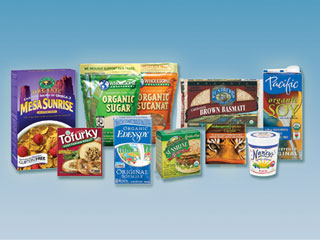Non-GMO is fastest growing natural food category
By Ken Roseboro
Published: May 1, 2011
Category: Non-GMO Market News

To access all the articles in this month's issue of The Organic & Non-GMO Report, SUBSCRIBE NOW.
Sales of Non-GMO Project verified products growing by 27%; sales topped $450 million in 2010
With increasing consumer concerns over genetically modified foods, sales of Non-GMO Project verified products are growing—fast. According to natural food market research firm SPINS, Non-GMO Project verified product sales grew 27% over the past year, making it the fastest growing segment in the natural and organic food industry. In addition, Non-GMO verified product sales totaled $450 million in 2010.
The 27% growth rate far exceeds the growth of other natural/specialty food categories including organic (9%), pre/probiotic (17%), fair trade (16%), gluten-free (11%), and others.
But in terms of sales volume, Non-GMO Project verified ranks seventh among 10 product categories, falling well below organic ($7.4 billion), gluten-free ($6.6 billion), whole grain ($4.6 billion), soyfood ($3 billion), hormone-free ($2.8 billion), and pre/probiotic ($2.6 billion).
The figures are for sales in natural food stores, specialty/gourmet supermarkets, and conventional supermarkets/mass retailers.
Nature’s Path is top-selling brand
SPINS tracks ongoing consumer response to the increasing availability of Non-GMO Project verified products. Baby Food (+10%) and Refrigerated Non-Dairy Beverages (+5%) are two categories that have seen considerable expansion of Non-GMO Project verified products on retail shelves.
The best-selling Non-GMO Project verified product categories are cold cereals ($62.7 million) and refrigerated non-dairy beverages ($61.1 million). These two categories combined account for 28% (14% each) of all Non-GMO Project verified product sales.
Other Non-GMO Project verified product categories include beans, grains, and rice; shelf-stable non-dairy beverages; teas; frozen fruits and vegetables; yogurt and kefir; condiments; frozen desserts; salsas and dips; entrees and mixes; rice cakes; and cookies and snack bars.
The top-selling Non-GMO Project verified brand is Nature’s Path Organic, which has an 18% share of the market followed by Silk with 10% and Lundberg Family Farms and RiceSelect, both with 9%.
Silk’s non-GMO verified products are seeing the fastest sales growth rate at 49%.
According to Megan Westgate, executive director of the Non-GMO Project, there are now more than 4000 products from 206 brands going through the Project’s verification program. Of those, about 1,700 are verified and eligible to display the Non-GMO Project Verified seal.
“Emerging from grassroots stage”
In a presentation given at the recent Natural Products Expo West, Michael Movitz, SPINS vice president of business development, said that the Non-GMO product category is “emerging from grassroots stage with many unknowns in the GMO battle, but GMO is a food system threat that will galvanize consumers more than the National Organic Program effort did.”
Movitz also predicts that non-GMO is a lifestyle-based issue that will follow a similar path to that of the gluten-free product category, which is the second leading natural/specialty product category behind organic.
Here are some other points Movitz discussed:
-
Third-party (non-GMO) certification and industry self-regulation and policing are essential while the federal battle wages over GMOs and labeling
-
The focus today in the non-GMO market is on protection and verification, but it will quickly need to include consumer messaging
-
Many “natural” items currently contain GMOs and it will take years to transition to non-GMO sources for these products and ingredients.
-
Consistency of information and certified products online and on-shelf will take time. Identification of non-GMO on labels will also need to be easy for consumers, i.e., a credible, publically recognized seal
-
There is much consumer confusion around organic vs. natural. Non-GMO is a tangible attribute that can resonate more clearly for consumers.
Overall, consumer response to Non-GMO Project verified products has been positive and according to Mary Ellen Lynch, SPINS’ director of consumer insights, “will continue to grow as consumer awareness and understanding of food safety issues, including GMOs, increases.”
© Copyright May 2011, The Organic & Non-GMO Report




